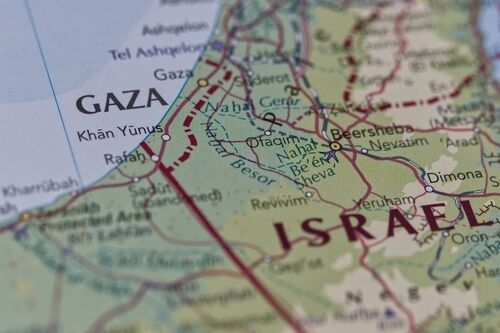Are Israel's actions in the Middle East 'just'?

October 7 marks the first anniversary of the terrible attacks on Israel by the terrorist group Hamas. There have been 1,195 casualties of that attack. About 800 of those victims were civilians and 36 were children and babies. Many died on 7 October, others while being being held hostage by Hamas. Israel’s response has been to seek to destroy Hamas, and their actions in Gaza have led to over 40,000 deaths. According to the UN, 21,000 children have been killed or are missing.
News from Gaza has been almost constant across the media ever since, but concerns about an escalating crisis across the region have increased in recent weeks.
The background to this escalation is the attacks by Hezbollah forces based in Lebanon on the north of Israel. The Hezbollah bombing over the last twelve months has forced around 60,000 Israelis from their homes. This second conflict, which began immediately after Israel attacked Gaza, drew little wider attention until comparatively recently: on 16th September, Israel remotely detonated pagers used by the Hezbollah leadership and later in the same week they detonated walkie-talkies used by the same leadership.
This was followed by Israeli forces entering southern Lebanon in the last week and attacking sites in Beirut and the rest of Lebanon. These attacks have killed Hezbollah’s overall leader as well as many of its wider group of leaders. But the attacks have also incurred civilian casualties and displaced hundreds of thousands of Lebanese people. Iran – which funds Hezbollah – responded by launching over 180 missiles at Israel, some of which broke through Israel’s missile defence system, and landed on a range of locations, including schools and hospitals.
CARE’s work is – and will remain - focused on the UK. We seek a better politics informed and shaped by God’s word because we believe this will transform lives. We do not take an official position on foreign affairs or international relations.
That being said, as Christians, we should not ignore the anniversary of Hamas’ attacks and the escalation of events in recent week; indeed, I myself cannot do so. But to be clear, this article is my personal reflection on this conflict and by sharing how I am engaging with this most tragic and complex area I hope I can help others do the same.
My starting point is humility.
In offering my own reflections on this matter I am mindful of my own limitations, mixed emotions, sinful desires and aspirations, my limited knowledge, and my inadequate experience in relation to this conflict.
But I am also not ignorant nor powerless.
I have sought to understand the history and the current context; to discern the truth from the rhetoric. I am a follower of Jesus, whose heart, softened by the Holy Spirit, cries out for the suffering I see in the news each day. I yearn for justice and righteousness, and I have a certain hope – the expectation rooted in the promise that Jesus will return, and that when he does, swords will be turned into ploughs and every tear will be wiped away.
So I do not look away from the horrors of a broken world: instead, I seek to engage with knowledge of the history and current situation, I give thanks for the privilege I have to live in a democracy where I can speak to my elected representatives and question what they are doing, and I support causes and organisations that seek to bring relief alongside advocating for peace and justice. And perhaps most importantly of all, I have God’s word to guide my thinking and the power of prayer to call on God to intervene.
Christians have always grappled with how to respond to war and aggression. This is not a new problem. But although sometimes Christians have twisted God’s word for selfish purposes and justified terrible atrocities, there are generally two predominant longstanding, worked-out and biblically faithful Christian approaches to warfare. These are pacifism and ‘Just War’ traditions.
I will immediately state my position is one of supporting the ‘Just War’ position.
I hate war and would go to great lengths to avoid it – but I am not a pacifist. I believe that there are legitimate arguments - biblically based – for taking a pacifist position, although I do not intend to outline the case for pacificism here. Instead, I want to examine how the position I do hold shapes my experience and reaction to this conflict.
The key biblical texts for framing the case for a ‘Just War’ are Romans 13 and 1 Peter 2:13-17. These passages state that governments are God’s appointed ‘servants and swords.’ There are many texts in the Old Testament setting out how Israel (in the Old Testament) was to conduct itself in war (for example, Deuteronomy 20), and these texts have informed Christian thinking and action since St. Ambrose and St. Augustine grappled with these issues in the fourth century.
Over the subsequent 1700 years, eight distinct criteria have emerged to frame any decision over whether to pursue conflict and to assess whether the use of violence can be justified. These are:
- Just Cause – the reason and cause for going to war must be good. This might mean defence against aggression or intervention in order to save lives.
- Just Authority – There must be a clear case for war that other objective parties not involved in the conflict acknowledge. For example, is the action consistent with international law, treaties, and agreements?
- Last Resort - The war must be a matter of last resort. All other means have been tried. We should never seek to take life or destroy lightly. Killing is always the very last resort we turn to.
- Just intention – the intention behind going to war must be good – the intention should not be about gain but about achieving a just peace.
- Probability of success – the war must be winnable: in other words, one should not engage in futile warfare but only to achieve a realisable goal.
- Announcement – the other side must know the terms on which peace can be achieved or maintained.
- Proportionality of cost – the means must be proportionate to the goals. The war must not do more harm than good. “No one should prescribe a cure that is worse than the disease” (Clarke and Rakestraw, Readings in Christian ethics vol. 2 (1996)).
- Just means – the means by which conflict is carried out must be limited to certain means that lay clear restrictions on what can and cannot be done. For example, non-combatants, neutrals, and third parties must not be harmed wherever possible; bombing military targets is legitimate even if there might be (though still a horrible consequence) civilian casualties as a result.
It is useful to hold these criteria – developed and tested by generations of thoughtful, faithful Christians - up to the actions of all sides in the current conflict. It is also important to remember that the eight criteria listed above cover both motivation and justification for war, and how conflict is to be conducted. Too often just cause is used to justify any means necessary to complete the mission. The Bible teaches us that the how is as important as the why.
I have found it helpful to return to these principles when looking for firm ground to assess and process what I see in the news.
And where has this left me?
Clearly Hamas and Hezbollah are terrorist groups. However ‘righteous’ they may feel their cause to be, they cannot justify using innocent bystanders and civilians – both Israeli and Palestinian – for their own selfish ends. There can be no justification for their actions, and I find it hard to believe that even now Hamas is motivated by a desire to defend Palestinians, given the way in which they have strategically used civilians as human shields. I am sure that for many of them their priority remains is to kill Israelis and destroy Israel.
When it comes to Israel my feelings are more complex and mixed.
Right now, at the time I am writing these lines – I am personally - deeply concerned and uneasy about Israel’s actions in Gaza, but I find that I have a different perspective in relation to the action Israel has taken (so far) in Lebanon.
Let me explain what I mean.
Over the last two weeks I can see how Israel’s actions against Hezbollah may be broadly aligned to the principles, safeguards, and restrictions laid down by a Just War framework.
They seem to have been intentional in targeting Hezbollah’s leadership, then moving to attacking specific Hezbollah ‘military’ targets, especially in southern Lebanon. There seems to be a more realistic goal of protecting their own population in northern Israel and their current stated military objectives match a UN resolution. This is not to downplay the impact on the civilian population – Christian and Muslim – many of whom have little sympathy for Hezbollah, and I continue to pray that Israel will be restrained and disciplined in its continued action over the coming days.
In my opinion this is different to what seems to have happened in Gaza.
No reasonable person could deny Israel’s desire for justice in light of what happened on October 7 2023. Cause, intention, authority, and the conditions for peace may all have been just. But over the last twelve months the probability of success (destroying Hamas) has seemed less and less likely, the violence seems disproportionate, and the means, questionable.
I have not personally been affected by the conflict in Gaza, but I understand the desire for justice, and God only knows how overwhelming my feelings might be if I had lost a loved one. I also understand the desire to see evil punished and destroyed. But while I seek justice, I must also remember that righteousness involves compassion and peace. I must remember that while I seek justice, it can never be achieved perfectly this side of Jesus’ return. While I want to see evil destroyed, it will be my Lord who is the one who will ultimately defeat it.
In a chapter on The Ethics of War and Peace-making Glen Stassen helpfully sets out ‘How not to argue for Just War theory.’ Stassen writes “lurking at the door are powerful drivers of revenge, hate, nationalism, racism, economic greed, power lust, hateful stereotyping of the enemy, ideological crusades, pride, and self-righteousness (see Gen 4:7). These seek to use just war theory not as reasonable criteria but as a rationalisation for killing.”
It is worth us remembering such words: good and just causes and intentions can easily become unjust in the face of sin. Can we discern such characteristics in the actions we see different sides perpetrate now?
Let us continue to pray for justice and compassion, and ask God to restrain in us and in others the sins that conflict can unleash. Let us be both realists (about what is possible) and idealists (about what we strive for) when speaking about this issue, and let us continue to pray for a resolution and for peace. And let us all examine our own hearts, as we endeavour to act righteously now and as we continue to long for the justice and restoration that, one day, we are promised.






